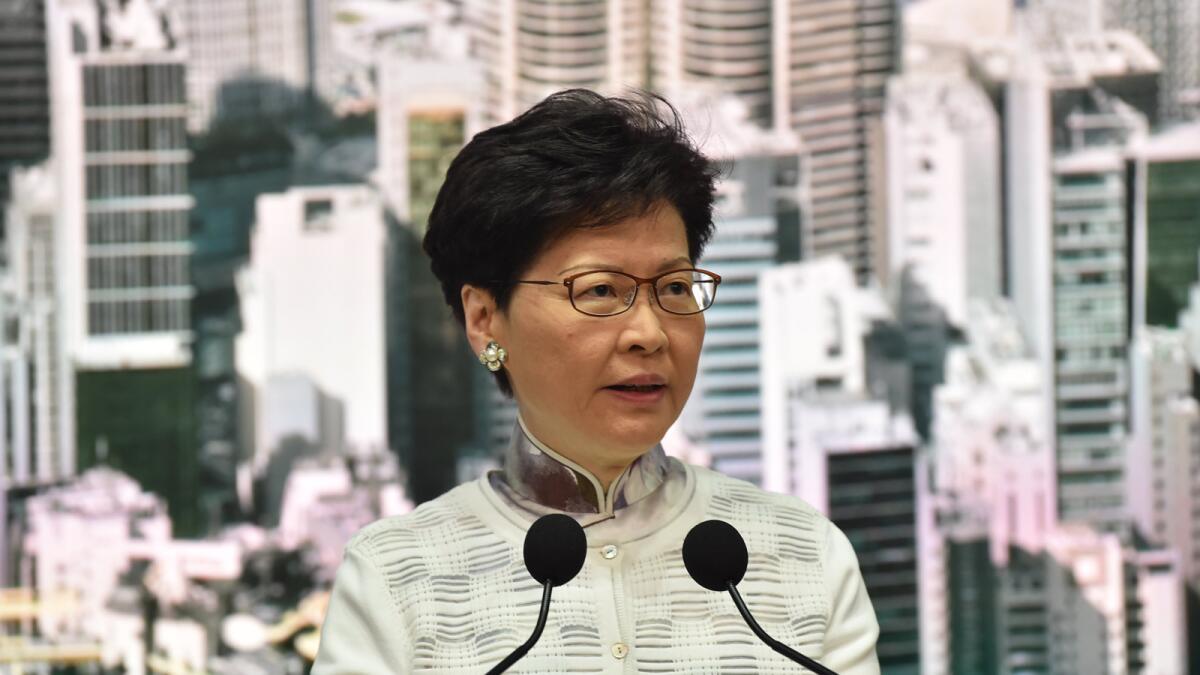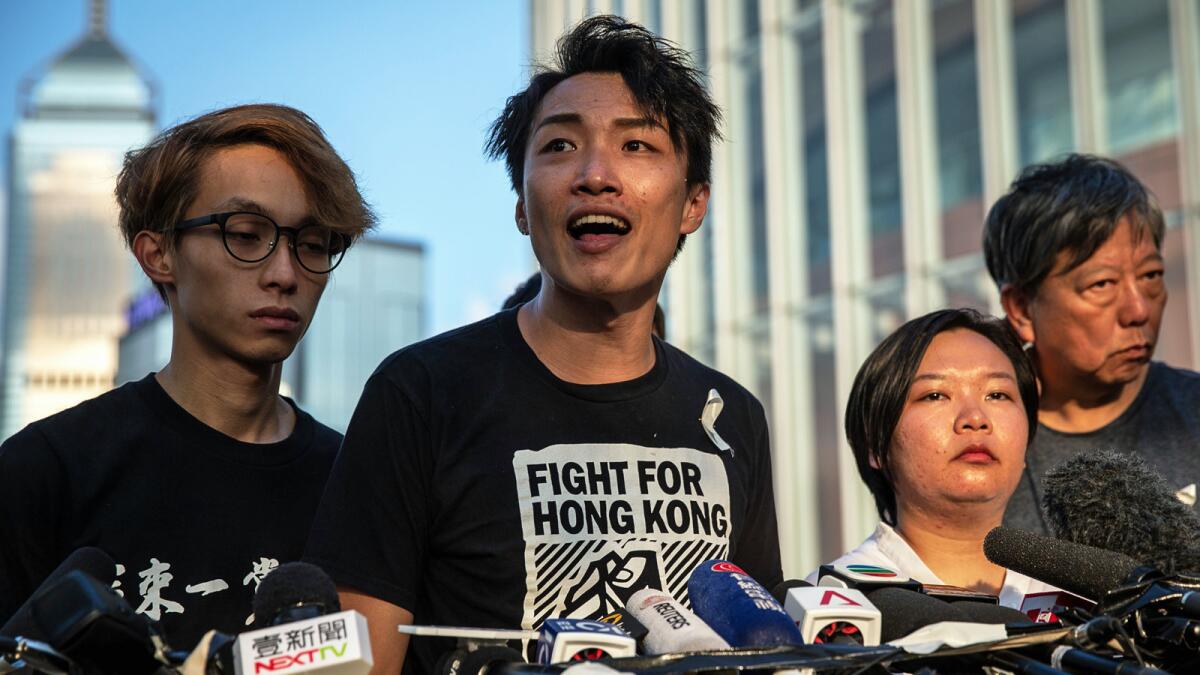Hong Kong leader delays unpopular extradition bill, but activists want more

- Share via
Reporting from Singapore — A sense of futility pervaded the throngs of protesters in Hong Kong this past week. Many said they chose to demonstrate out of principle, not because they believed they could prevent the passing of an extradition bill that would have left them largely at the mercy of the authoritarian government in Beijing.
Then the unthinkable happened. On Saturday, Hong Kong Chief Executive Carrie Lam announced that the proposed legislation she spent months championing would be suspended indefinitely.
The groundswell of resistance, it appears, was too large to ignore.
“There’s a sense of victory that at least we were able to stop it for now,” said Fernando Cheung, a legislator for the opposition Labor Party who, like many in his camp, is still calling for the bill to be withdrawn.
“The fight will definitely continue,” he said.
The stunning reversal suggests there are limits to how much Beijing can encroach on Hong Kong’s autonomy despite years of threats and official impunity — including the disappearances of booksellers and the abduction of a mainland billionaire from a luxury hotel by Chinese state security.
The bill, which would have amended a law in order to allow Hong Kong to send people to China for trial, sparked fears of losses to freedom of speech and assembly — rights that are guaranteed under Hong Kong’s constitution for 50 years after Britain returned the former colony to China in 1997.
Lam’s proposed legislation was so unpopular that roughly 1 in 7 people in the city of 7 million were estimated to have attended peaceful demonstrations last Sunday to voice their opposition.
From there, the pressure only mounted on Lam, who said the amendments were needed to close a loophole that protects fugitives in Hong Kong.
On Wednesday, mass demonstrations outside the government’s headquarters descended into chaos and violence, leaving Hong Kong’s financial district shrouded in tear gas in a scene reminiscent of the 2014 Umbrella Movement. Protesters, journalists and police were injured in the melee and charges were leveled at the police of excessive force. On Friday, thousands of mothers staged a sit-in demanding the safety of the city’s youth and an end to the proposed bill.
Perhaps more important in the ultra-capitalistic territory, members of Hong Kong’s business community turned on Lam. Reports of tycoons shifting capital out of the city to rival financial centers including Singapore sent a signal that even the rich and powerful were worried about their futures in Hong Kong — particularly because the bill allowed China to request a suspect’s assets in Hong Kong be frozen or seized.
“We welcome the government’s decision to suspend resumption of the second reading of the extradition bill, which will allow things to cool down and let everyone return to rational debate,” Aron Harilela, chairman of the city’s biggest business group, the Hong Kong General Chamber of Commerce, told the South China Morning Post.
Hong Kong’s special status with the United States was also jeopardized by the extradition bill. Amid a worsening trade war with China, U.S. congressional lawmakers threatened to reintroduce a bill that would take trade privileges away from Hong Kong if they deemed it insufficiently autonomous from China.
The growing crisis prompted more calls for Lam to step down amid accusations that she is increasingly out of touch with citizens — a criticism that only heightened perceptions she is primarily a proxy for Beijing.

It was against this backdrop that Lam made her announcement Saturday standing at a podium in front of a wall-sized picture of Hong Kong’s iconic skyline and harbor.
The longtime civil servant who was picked by Beijing two years ago to lead Hong Kong was unapologetic and said opposition to the bill was the result of her failure to convince people that there was nothing to fear from its implementation.
“My relevant colleagues and I have made our best efforts, but I have to admit that our explanation and communication work has not been sufficient or effective,” she said.
Lam deflected questions about resigning and denied that the decision to suspend the legislative effort was aimed at placating Hong Kong residents on the eve of another mass protest planned for Sunday.
Lam also refused to say if she met with members of China’s central government, an almost certainty given the magnitude of recent events, experts said.
China’s central government released a statement Saturday saying it supported Lam’s decision while also restating its position that the amendments were necessary.
Activists and opposition lawmakers, though pleased that the bill was shelved, were furious that Lam was unapologetic and that she praised the work of police despite charges of extreme force.
“Carrie Lam really has a talent for agitating the public,” said Cheung, the Labor Party legislator. “This should be seen as a retreat or at least a sort of compromise made by the administration. However, the attitude she displayed was as if she committed nothing wrong.”
Nathan Law, a founder of the pro-independence political party Demosisto, said opposition to the bill would not end until it was fully withdrawn. He also demanded Lam resign and that an investigation be launched of police conduct the past week.
“The suspension is not enough for people to retreat,” he said. “We will continue to pressure until all the demands are fulfilled.”
Calls were also growing for the government and police to reverse their decision to deem Wednesday’s demonstrations a “riot.” Doing so would reduce the legal liability for those arrested or implicated. Protesters argue they did not provoke riot police into action.
Students at Hong Kong University said they were not satisfied with Lam’s response Saturday, calling her insincere.
“Her announcement was full of excuses,” said a 19-year-old law major who provided only his last name, Ting. (Many young Hong Kongers are nervous of reprisals by the police for speaking out or participating in the demonstrations.)
“I will continue to fight for a withdrawal and join the protest on Sunday,” he said.
The reversal of the controversial bill harks back to 2003 when an estimated 500,000 people marched in Hong Kong to protest an anti-subversion law pertaining to China. The government eventually backed down and shelved the proposed legislation.
Ben Bland, an analyst at Sydney-based think tank Lowy Institute and the author of “Generation HK: Seeking Identity in China’s Shadow,” said Lam’s reversal was a rare victory for Hong Kong’s autonomy, but warned many threats remained.
“Suspending the bill will give some temporary succor to supporters of democracy in Hong Kong as it shows that when they are united and act en masse, they can force the government to think twice, at least temporarily,” he said. “The problem is that this bill is only one of many threats to Hong Kong’s freedoms and autonomy, which are increasing at a worrying rate.”
Bland said Hong Kong’s legislature, for example, was still charging ahead with a bill that would impose up to three years in jail for disrespecting the Chinese national anthem.
“I don’t think the suspension of the bill changes the fundamental tension facing Hong Kong,” he said. “Beijing is determined to curb opposition in Hong Kong and accelerate the city’s integration into mainland China. Many Hong Kongers are determined to resist these threats to their freedoms, autonomy and core identity. Yet the more they fight back, the more Beijing feels the need to crack down in the name of national security.”
Special correspondent Tang Wai Yin in Hong Kong contributed to this report.
More to Read
Sign up for Essential California
The most important California stories and recommendations in your inbox every morning.
You may occasionally receive promotional content from the Los Angeles Times.











